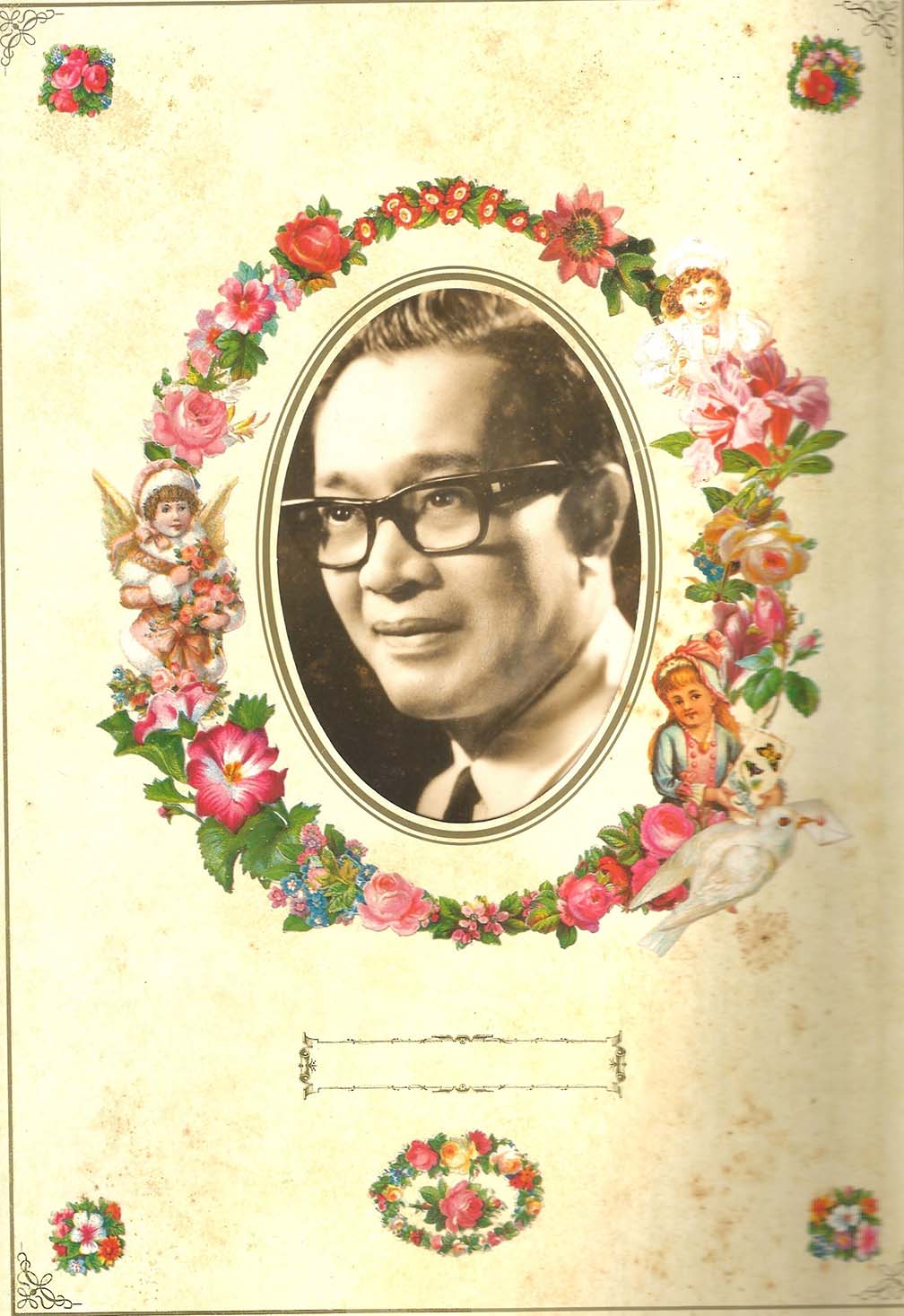“Daddy was passionate about poetry and writing. It was what he lived for and suffered for, pursuing it to the hilt. It was this dedication that in a way inspired me to be good in what I chose to do as an artist.” These words, uttered by my mother, Rebecca “Becky” Demetillo-Abraham, lingered in my mind as I pondered on our conversations about our family.
Ricaredo Demetillo, the father of my mother, was a Filipino writer in English (poet, essayist, playwright, and critic), and professor of Humanities at the University of the Philippines in Diliman.
My father, Pedro “Edru” Abraham, Jr., knew of Prof. Demetillo even before he met my mother because of his “outstanding academic reputation.”
He was quiet and distinguished, held in very high regard by everyone. In workshops, he was respectfully and sometimes fearfully called “The General,” which means he had the final critical say. He was “a sublime man-of-letters in academe; a poet of highest integrity and profundity.” To me and my cousins, however, Ricaredo Demetillo, was simply “Lolo U.P.”
My brother Apollo “Sheikh” Abraham, the eldest grandchild in both sides of our family, named our grandparents Ricaredo and Angelita, “Lolo U.P.” and “Lola U.P.,” respectively, when he was only three-years-old. The nicknames stuck. Everyone in the family followed suit and called them by their monikers.
A child of true love, he is
cherished much.
All treasure him within our
singing house.
He finds the arms to coddle him
to sleep
Or dandle him upon
obliging knees.
Child, may our life be full of peace and joy.
But if it isn’t, may you be full of strength
To weather all the storms besetting life.
Now, sleep in peace, without a fear, my love.
—Excerpts from “Poem for my Grandson One Month Old”
GROWING UP YEARS
Ricaredo Dipus Demetillo was born in Dumangas, Iloilo on June 2, 1920 to Queruben Demetillo, a farmer who appeared in sarsuelas, and to Rebecca Dipus-Demetillo, a housewife.
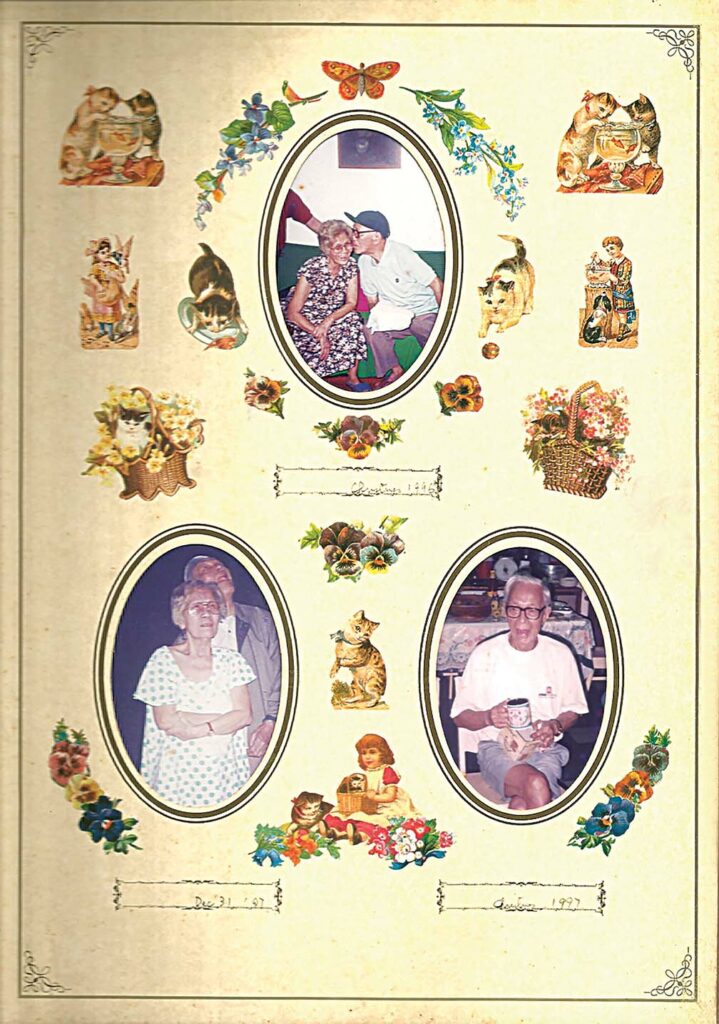
He received his primary education at the Dumangas Elementary School where he met his future wife, Angelita Delariarte. He had to walk to school barefoot even if the school was about an hour away by foot from his home in Cansilayan.
Amidst his struggles, Lolo U.P. was an honor student all throughout his elementary and high school years, often first or second in rank. He was good in elocution and won a lot of awards. He even acted in school plays, often portraying our national hero, Jose Rizal.
However, his family’s poor financial situation hounded him and became a source of insecurity as he was growing up. He would talk about their house being void of matches and gas so he would regularly run to someone else’s house to ask for flaming coconut charcoal. He would rush back to his home so his family could have flame for cooking. He often talked about how he had no money to buy shoes for his graduation from the Iloilo High School. So, he plugged the holes in the soles of his battered shoes with karton (cardboard) for the ceremony.
Lolo U.P. was also stricken with Bell’s Palsy, which caused half of his face to appear drooped.
When Lolo U.P.’s parents and siblings, Excelsa, Priscilla, and Cefredo, moved to Cotabato, he decided to stay behind in Iloilo to study.
When World War II broke out, he received a scholarship to study Divinity at the Central Philippine College (now Central Philippine University). He was assigned to be the student pastor of the local church and led the congregation in singing hymns. He preached in the middle of the plaza. He led prayer meetings as well.
The moment someone yelled, “ara na ang mga Hapon,” Ilonggo for “the Japanese are coming,” there would be people who would stay put and continue praying as they knelt, while Lolo U.P. and the others would speed off to the next barrio for safety. He also became part of the propaganda. One day, Lolo learned about the horrific demise of the missionaries who taught in his school as they were herded by the Japanese soldiers inside a church and were left trapped as the soldiers burned the church.
Lolo U.P. married Lola U.P. Angelita Delariarte at the Dumangas Baptist Church in 1944. Lola U.P. gave birth to their eldest child Darnay, and second born, Rebecca (Becky) at their home in Barrio Tabucan, Dumangas assisted by a comadrona (midwife). The fraternal twins, Lester and Weston, were born at the Silliman University Hospital.
Lolo U.P. pursued his education as he began his family with Lola U.P. He earned his B.A. degree with honors (cum laude) from the Silliman University, Dumaguete in Negros Oriental. He also earned his Master of Fine Arts degree in English and Creative Writing from the State University of Iowa in 1952 as a scholar of the Presbyterian Board of Foreign Missions in the U.S.A. (1950-1952) and as a fellow of the Rockefeller Foundation (1952).
Lolo U.P. first taught at Silliman University. There he held classes on modern poetry, news reporting, and editing, and served as the adviser of the Sillimanian, the weekly student newspaper, and Sands and Coral, the campus literary magazine. He yearned for greener pastures and more intellectual freedom, however, and found both at the University of the Philippines (U.P.) in Diliman.
He arrived in the campus in 1955. There he became a faculty member of the English Department and then later the Humanities Department (now the Art Studies Department), combining teaching with creative writing. He was also Poet-in-Residence from 1981 to1985.
LIFE IN U.P. DILIMAN
When Lolo U.P. began teaching in U.P. Diliman, he, together with Lola U.P. and their children first took up residence in Cubao. They soon transferred to Area 3 and later, to Area 14 in U.P. Diliman where their children spent much of their childhood and teenage years. The family lived in the quonset hut on stilts that the university provided for faculty members.
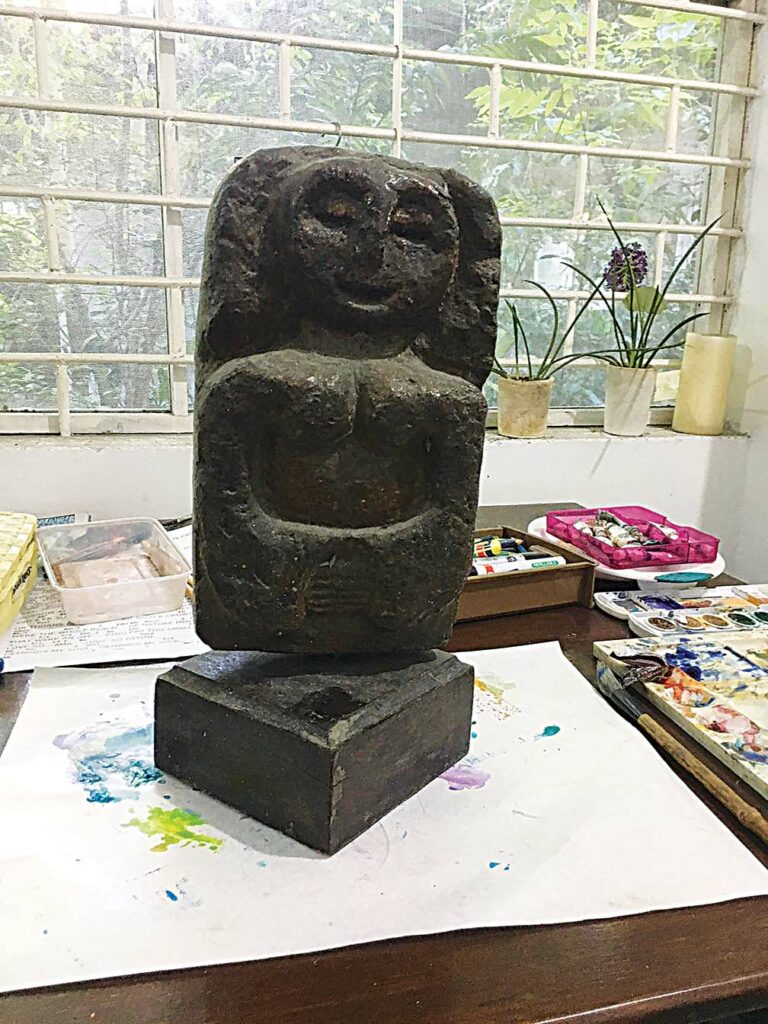
My Uncle Weston was around three-years-old when he saw Lolo U.P.—without any formal training and proper tools—sculpt a figure from adobe in their home using a kitchen knife. My Uncle Lester remembers Lolo U.P. bringing him and his twin to the barber to have their hair cut once a month. Lolo U.P. was also seen regularly typing on his Royal typewriter in their bedroom. My mother Becky says Lolo U.P. usually wrote in longhand and rarely made any erasures before giving his manuscripts to the typists.
Music was a staple at their household as Lolo U.P. constantly sang Protestant hymns at home, his tenor voice ringing so loudly that neighbors would hear him. Lola U.P. constantly sang, too, and managed the household. She often designated household chores to their children.
Lolo U.P. sometimes rewarded Uncle Weston and Uncle Lester 5-centavo and 10-centavo coins—a big amount at the time—when they behaved properly, did their chores, and did other things to his liking. The family was together at mealtimes where they would talk about school and other goings-on in their lives.
The family regularly went to the Church of the Risen Lord (C.R.L.) on Sundays with the children attending Sunday school and my grandparents singing and worshipping with the congregation.
Artists, writers, painters, and academics would often visit Lolo in their house.
According to my mother, “Daddy [Lolo U.P.] wrote about art and literary criticism and gained friends from those circles.” Filipino painters, Jose Joya, Federico Alcuaz, Constancio Bernardo, Hernando Ocampo, Arturo Luz, Cesar Legaspi, and Vicente Manansala gifted Lolo U.P. with their masterpieces, which were displayed prominently in Area 3 and mostly in Area 14.
HIS OWN WORLD
Lolo U.P. was constantly reading and writing. He mainly spoke Ilonggo to Lola U.P. and English to his children and other people. But he said the Tagalog words “salamat,” “magkano ito,” “bayad ho,” and “para” when he had to.
He didn’t have vices like drinking, smoking, swearing, and gambling. But he loved to eat ice cream. He watched a few plays with my brother Apollo, which was a good bonding experience. He also saw movies with Uncle Weston and Aunt Malou’s son Sheehan.
According to my father, who was Lolo U.P.’s roommate in the 1980s until his retirement in June 1985, “he would walk alone stoop-shouldered around [U.P.] campus seeming to be in deep thought, contemplation or meditation.” My mother added that he would walk to his classes at the Palma Hall in U.P. Diliman and walk back home. He always had his meals at home and never asked Lola U.P. to prepare food for him to take to school.
This habit of walking continued even when Lolo and Lola moved to their house in Baranggay Bungad, Quezon City.
“Gentle, kind, mild-mannered, and quiet.” A number of family members have said these words to describe Lolo U.P.
My father recalled that they talked about family and about the Department of Art Studies and academic matters, then about the Marcos dictatorship and public affairs including activism on and off campus. He added: “We would talk about world affairs, too, from geopolitics to nuclear disarmament. He would always show me his latest writings which I would read avidly and [he] appreciated my remarks sometimes critical.”
According to my aunt, Yoshiko “Kiko” Kitada-Demetillo, the wife of Uncle Lester, Lolo U.P. was a gentleman, very intelligent, straightforward, and very honest—too honest. She recalled that back in 1982, she requested Lolo U.P. to babysit for her then infant son Shogen while she went to the grocery. When she came back, she saw Lolo U.P. singing opera as he rocked Shogen’s Crib. Lolo U.P. would eagerly talk about the Humanities when asked by Aunt Kiko.
“He was always singing old Protestant hymns. He was often buried in a book,” my brother Apollo shared. “Lolo would often ask how I was. He was keen to know what books I was reading. When I gave an answer, he would discuss the book with me whether it was about King Arthur or Robin Hood. My Lolo would often give me books as gifts. At 10, when most kids wanted toys, he gave me Bulfinch’s Mythology or The Iliad… [That’s when] I learned to appreciate literature… His best advice to me was to read and read; you open yourself up to different worlds other than your own [when you do].”
Lolo U.P. wasn’t afraid to go against the status quo. He didn’t go with the flow.
“Daddy had his own world… I get to know Daddy more when I read his poems. I get to see his character,” Uncle Lester shared in the vernacular. “Here’s this gentle person who was uncompromising with his art—and that I respect. He wasn’t there to impress anybody. And he said things that were blunt and stingy… You should believe in yourself rather than allow other people to dictate what you’re supposed to do. He [had a] point of view, which [was] probably contrary to [what] most people [believed]… How come this individual always thinks otherwise? I love that… I appreciated Daddy more when I began reading his poems.”
Lolo U.P. also worked really hard.
Uncle Lester said, “He’s always been an inspiration… I would always see the guy working like hell. That’s enough… When [Daddy] talked in the house with other artists, other intellectuals, you pick up little pieces [of knowledge] … your way of thinking gets affected… [you become] open…liberal.”
Lolo U.P. would always tell Uncle Lester when he was in high school to read the works of William Shakespeare, George Gordon Byron, and Henry Wadsworth Longfellow. Uncle Lester shared “… the rhyming, the construction, I would always have that in my head… I would always open the books and just read those poems… I still have those moments [when] I just want to take a look [at those books]. That’s why when I read the poems of other people [now], I get inspired… I got the patience to read poems.”
My mom Becky, on the other hand, remembered Lolo U.P.’s support of her as he and Lola U.P. seldom missed programs and concerts she was in whether they were with the C.R.L. Choir, U.P. Concert Chorus, plays, musicals or with Inang Laya. “He was an ardent fan, I suppose, when it came to my singing,” mom shared. “Daddy never discouraged me from pursuing what I wanted to do… even as I went fulltime in doing political work as [vocalist of the protest duo] Inang Laya.”
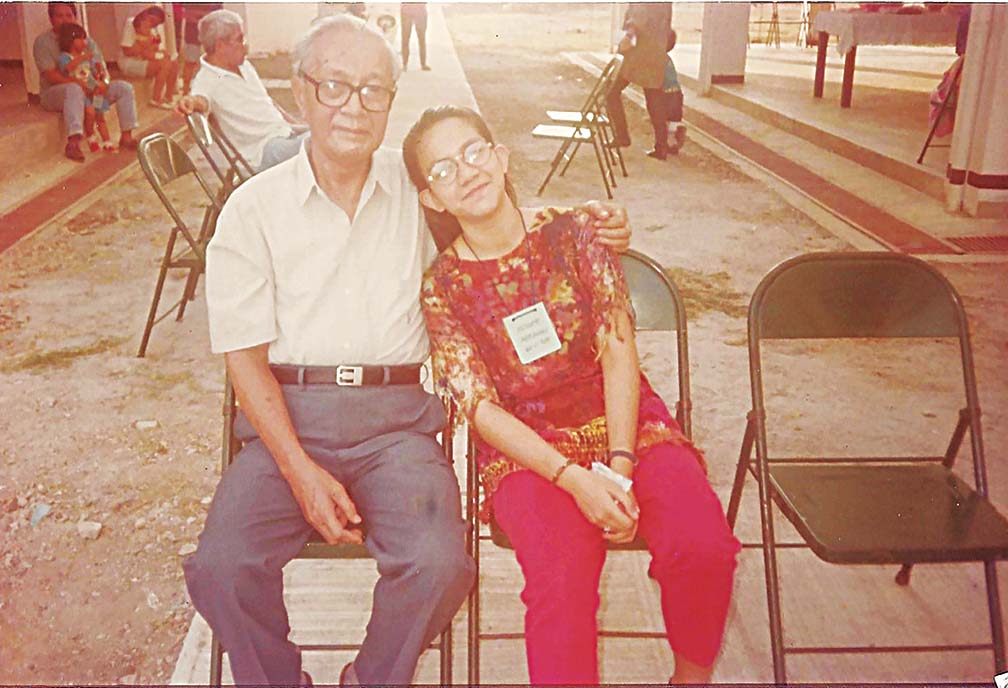
I remember Lolo U.P. watching my ballet recital with Lola U.P. at the Abelardo Hall when I was in first year high school. I’ve been performing as a singer and dancer since grade school, and knowing that my family was in the audience was precious; I always felt supported. My favorite moment with Lolo U.P. also happened in high school. I requested him to read a short poem I wrote for my class. He took a look at my work, smiled, and gave me encouraging words. At that moment, I was pleasantly surprised; I couldn’t believe it! It’s only later that I learned from family that Lolo U.P. was very direct with his likes and dislikes. That’s why the encouragement I got from that moment has remained with me ever since.
EXPRESSIONS OF LOVE
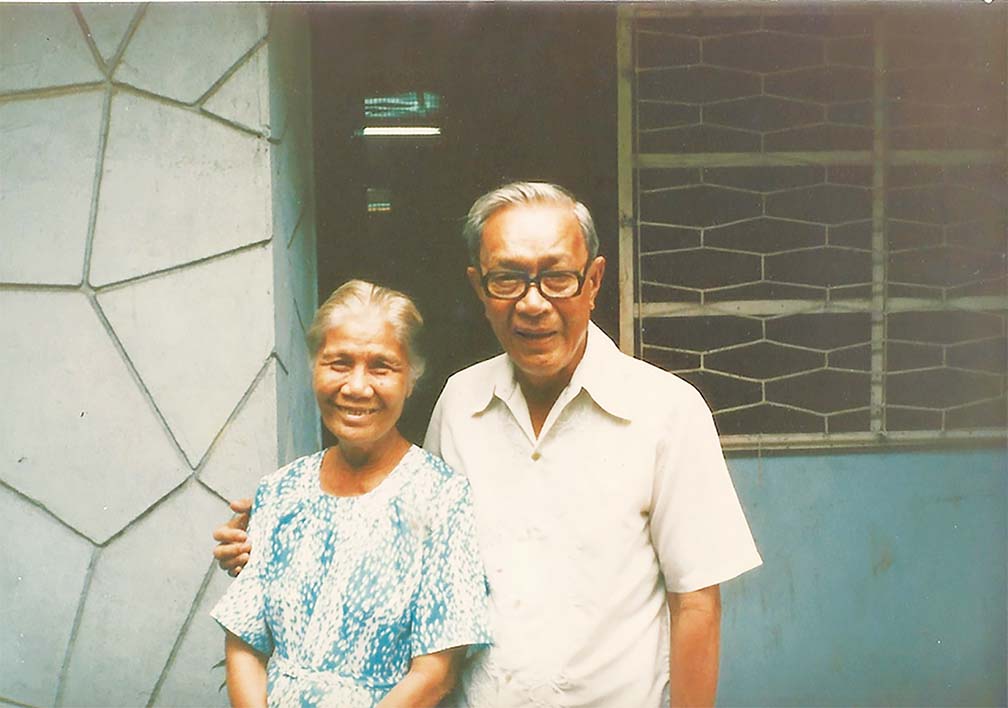
“I am one with all you deeply love.” This line from Lolo U.P.’s poem entitled, “If I should die,” speaks to me. The poem is close to my heart because it was set to music by my Dad and has been read and sung by my Mom on many occasions. It’s my Mom’s favorite poem by Lolo as well.
If I should, die, think
not of tears.
Think of the sun that
laughs above us
And yet scorns not the
lowly grasses,
For see, it fondles bud and leaf, then passes
To scatter gold-dust when
it smears
The summer fruits with
prodigal love.
Nor mourn my sudden metamorphosis—
I’m one with all you deeply love:
I am the wind that lingers
at your hair;
I am the marvel that you pause
to stare
At; also alpha in each genesis
And all that trembles in a
sudden tear.
So live! For all that owes
its life to sun
Is part of me who is
of cosmic dust;
And all the wonder
in a child’s caress
And all the fervor of a
lover’s kiss
Becomes the image that
of me you’ll keep—
Your lover to the end,
my little friend!
—From the poem, “If I Should Die”
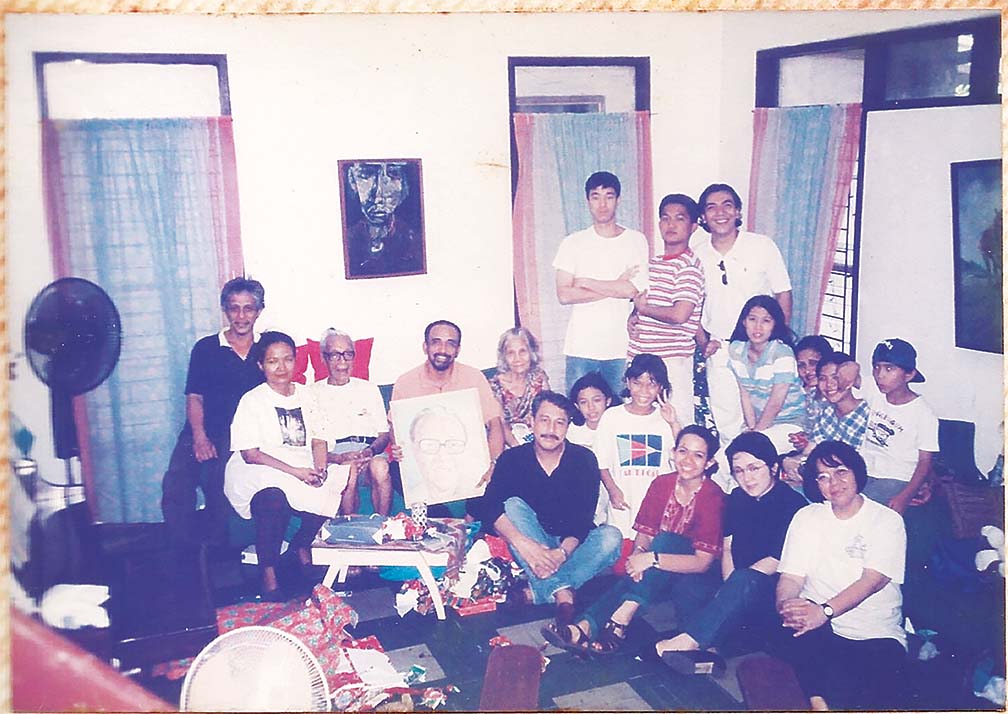
During our Family’s Christmas party, Lolo U.P. went up to his bedroom to get his portrait painted by Uncle Weston. He proudly showed it to all of us in the sala (living room). I felt it was his way of saying “I love you” and that he was about to bid us goodbye.
In 1998, the inevitable loomed as Lolo U.P. fell gravely ill with pneumonia and other complications. He eventually was brought to St. Luke’s Hospital where he lay comatose for over a month.
I was by the foot of Lolo’s U.P. bed when I looked at him and said, “I love you, Lolo.” At that moment, he nodded his head. I felt he heard me.
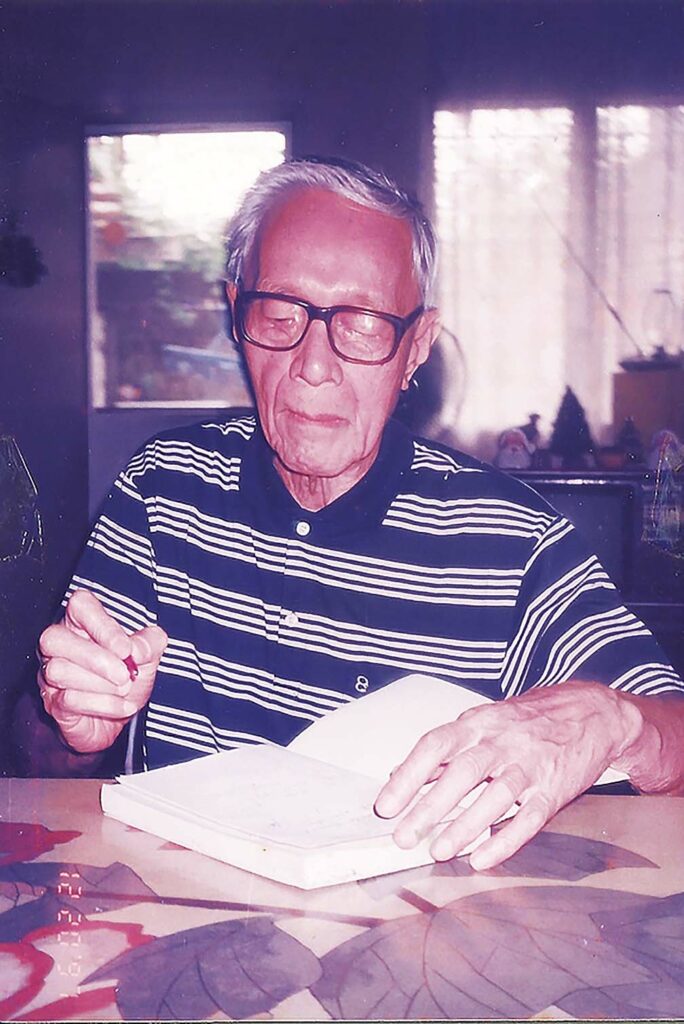
My Mom spent hours at his bedside, singing songs she knew including Ilonggo songs Lolo taught her, and hymns Lolo loved. Lolo U.P. shed a tear when mom sang the 23rd Psalm. It was then my mom knew Lolo could still hear her.
In our memories and through his writings, Ricaredo Demetillo—our Lolo U.P.—lives on. And when I miss him, he will always just be a thought and a poem away.
____________________
(EDITOR’S NOTE: We extend our apologies to our readers and the family of the late Ricaredo Demetillo for the following lapses in proofreading in the printed version of this feature which appeared in the June 2022 issue of the Philippines Graphic—Ricaredo Demetillo died on March 27, 1998 (not on Feb. 12, 1998); The whole poem “If I Should Die” was featured (and not just an excerpt of the poem); Ricaredo Demetillo’s last photo was taken on Feb. 12, 1998, about a month before his death)

